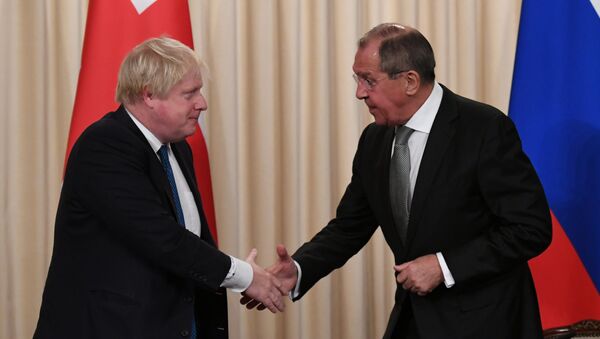The top diplomats of Russia and the UK have agreed that the level of bilateral relations is unsatisfactory and called for improving them:
"Problems have accumulated, their load is dragging us back, although both sides, in my view, want to find ways to overcome them," Sergei Lavrov said.
"It is a sad truth that our relations having gone through a good patch, in the 1990s and the early 2000s, are now going through a bad patch. There's no question of that at all. But one of the reasons for coming here is that there is no point in simply sitting on the sidelines and complaining about each other. We have to engage and we have to talk to each other," Boris Johnson observed.
He added that the sides had "every reason to build trust now".
The relations between Moscow and London have been quite tensed over the past several years due to existing disagreements on a number of issues, in particular on the situation in Donbass as well as in Syria, which was accompanied by unfriendly statements by senior UK politicians with regard to Russia. The bilateral political dialogue between the states has been completely discontinued.
The foreign secretary noted that despite the existing difficulties "there were signs of economic progress" and "increasing exports."
The Korean Issue
Both London and Moscow have expressed willingness to facilitate the reconciliation of the world's crises — and this is the magnet that may help build bridges between the sides.
"Areas of our bilateral relationship are promising and encouraging and where I want to see more progress," Johnson said, specifying that London and Moscow could cooperate on such international issues as the North Korean nuclear problem, Syrian crisis and Iran's compliance with the Joint Comprehensive Plan of Action (JCPOA).
He was echoed by Lavrov who stated that "Russia and the United Kingdom, as permanent members of the Security Council, should work more actively and consistently within the framework of P5 on all issues of the agenda for this key body."
"We share the same objectives, which is to make sure that there is peace and stability in the Korean peninsula, indeed that it is a de-nuclearized Korea. We do, neither of us want to see North Korea armed with ICBMs," Johnson stated.
The situation on the Korean Peninsula continues to deteriorate following a series of ballistic missile tests and a nuclear test conducted by Pyongyang earlier this year.
On September 3, Pyongyang claimed that it had detonated a hydrogen bomb, while on November 28, North Korea tested its most advanced intercontinental ballistic missile, Hwasong-15.
Tensions in the region were further exacerbated by joint military drills conducted by the US military together with its Japanese and South Korean allies in close proximity to the North Korean borders.
Brexit Exchange
During the conference, Lavrov praised his British colleague for a comment the latter made in November when Johnson said he saw no evidence, "not a sausage," of Russia's alleged meddling in British elections.
"Not successfully," the head of the Foreign Office interjected.
This remark prompted Lavrov to respond that his British counterpart apparently seeks to avoid "criticism back home" and to safeguard "his reputation."
"It's your reputation I'm worried about, Sergei," Johnson jokingly replied.
Joint Battle Against Terrorism
Lavrov urged the United Kingdom not to create impede cooperation with Russia in fighting terrorism.
"This is a very important topic where there should be no artificial restrictions for cooperation on a truly global level between countries … There should be no attempts to condition this cooperation with anything," the Russian foreign minister said.
He also added that Moscow and London are already in touch on the issue of ensuring security at the 2018 World Cup in Russia.
Johnson said that London and Moscow continue to cooperate on fighting against terrorism "at an important level" despite existing difficulties in bilateral relations.
"Obviously, since serious difficulties arose in our relationship, we have been unable to have the full [counterterrorism] cooperation we had in previous years, but that doesn't mean that cooperation is not taking place at an important level. I think there are contacts taking place," Britain's top diplomat explained.


